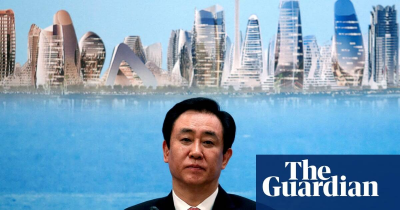The Guardian-Evergrande Chinese firm and founder fined over 78bn fraud claims
March 19, 2024 3 min 586 words
这则报道揭示了中国房地产巨头恒大及其创始人的重大舞弊行为,给中国金融市场带来了巨大冲击。恒大被指控在债务违约前两年通过欺诈手段夸大营收高达780亿美元,导致公司被罚款58亿美元,创始人许家印被罚款650万美元并终身禁入中国市场。这一丑闻揭开了中国金融业严重的诚信问题,也引发了对于监管体系的反思与改进。恒大的破产清算不仅在中国国内引发了连锁反应,还对中国影子银行业产生了负面影响。报道反映了中国金融体系的脆弱性和监管漏洞,也提醒着投资者要保持警惕,审慎对待市场风险。
The troubled Chinese property developer Evergrande and its founder have been fined over allegations that they fraudulently inflated its revenues by $78bn (£61.6bn) in the two years before it defaulted on its debt.
Beijing’s stock watchdog fined the company about $580m for allegedly falsifying its revenue, among other violations, as it conducts a deep clean of the country’s embattled financial sector.
The company said in a release to mainland Chinese stock exchanges late on Monday that its chair, Hui Ka Yan, was fined $6.5m and banned from China’s markets for life. Hui, also known as Xu Jiayin, was detained by authorities in September for suspected “illegal crimes”.
Evergrande is the world’s most indebted property developer, with more than $300bn in debts. It is among dozens of Chinese companies that have collapsed since 2020 under official pressure to rein in excessive borrowing that the ruling Communist party views as a threat to the economy.
The notice cited a preliminary ruling by the China Securities Regulatory Commission, which recently got a new chief, Wu Qing, an industry veteran with a reputation for being tough on market misbehaviour.
Evergrande said regulators found it had overstated its revenue in 2019 by nearly $30bn, or about half. In 2020, they allege its revenue was overstated by nearly 80%, or $48.6bn. The CSRC also suspects problems with bonds Evergrande issued, it said.
Hui, as chair, was “the person in charge who is directly responsible and at the same time serves as the actual controller of the organisation and guidance”, it said. “The means were particularly bad and the circumstances were particularly serious.”
It also named and fined other Evergrande executives who it said were responsible for the falsified reports and had “behaved badly”.
A Hong Kong court ordered Evergrande into liquidation in late January after efforts to restructure its foreign debt failed.
Real estate helped fuel China’s economic boom as families bought into one of the few potentially high-yielding assets available for investment. But developers borrowed heavily as they turned cities into forests of apartment and office towers, pushing total corporate, government and household debt to more than 300% of the country’s annual economic output, unusually high for a middle-income country.
The government has stepped up support for the real estate industry, listing thousands of projects eligible for loans from state banks that stepping up to help contain the damage. Party leaders have emphasised that they want to ensure that families are able to obtain housing they have paid for.
Regulators are striving to reassure investors after Chinese markets slumped in the past year, in tandem with the downturn in the property market. Even after regulators announced new policies to support the markets, promising to root out insider trading and other abuses, the Shanghai Composite index is still 5.8% below its level a year earlier, and Hong Kong’s Hang Seng has fallen 15.3%.
The fallout from the property crisis has also affected China’s shadow banking industry – institutions that provide financial services similar to banks but operate outside regulations.
A Chinese media report said police in Beijing had detained suspects, including senior executives, in a case related to asset management company Zhongzhi Enterprise Group. Caixing Global, a financial news outlet, said the investigation aims to recover investor losses.
Zhongzhi, a conglomerate that lent heavily to developers and operates trusts, insurance, leasing and other fund management businesses, declared it was insolvent and filed for liquidation in November.
Associated Press contributed to this report

